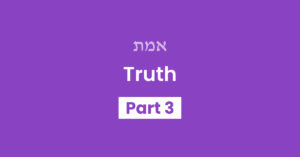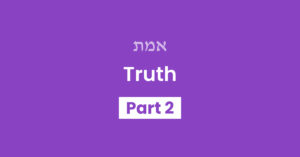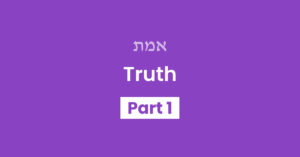For the past few weeks, we have been learning about the middah of Emes. First, we explained how Emes is such a fundamental middah because truth builds trust. People are more likely to trust other people if they are known to speak only the truth.
Next, we explained how “speaking the truth” applies to ourselves also; the more we take our own words seriously and follow through with our commitments, the more we will learn to trust ourselves, and thereby make steady, solid progress in our growth in mitzvos.
Finally, we discussed what it means that Hashem’s “signature” is Truth. It means that Hashem is the only One whose existence will be true forever. Hashem always was, is, and will exist forever. By contrast, we, human beings, are part of this temporary physical world. So the only way for us to gain access to eternity is by attaching ourselves to Hashem, because Hashem is the only One who will exist forever.
Hearing the Emes
Before we conclude the middah of Emes for this month, we’d like to point out one more aspect of Emes: Just as it’s important to speak truthfully, it’s equally essential to listen truthfully, also. “Listening truthfully” means listening fully to what someone is saying, and making sure you hear all the details accurately.
“Listening truthfully” means listening fully to what someone is saying, and making sure you hear all the details accurately.
Rabbeinu Yonah writes1 that it’s important to listen accurately to what other people say, because otherwise, we might mix up what they said, and tell it over wrong to others.
For example, this is what happened to Chava when she didn’t listen carefully to what Adam said. Hashem told Adam and Chava that they were not allowed to eat from the Tree of Knowledge, and Adam conveyed this message to Chava. ButChava didn’t listen carefully enough. Chava thought she wasn’t allowed to even touch the tree, either. So when the snake soon came along and pushed Chava to touch the tree – and nothing bad happened – she became confused. She began to doubt Adam’s words, and decided to eat from the Tree of Knowledge – a sin that ultimately brought curses upon all of humanity for thousands of years, until this very day.2
Rav Yerucham Levovitz explains3 that the story of Chava teaches us that someone who does not listen accurately will ultimately end up transgressing Hashem’s mitzvos. Just as Chava should have listened carefully to what Adam told her, we, too, need to “listen with truth” in order to understand exactly what Hashem wants from us.
Someone who does not listen accurately will ultimately end up transgressing Hashem’s mitzvos.
Indeed, one of the 48 Kinyanei Torah (ways to acquire Torah) is “Shmi’as Ha’Ozen” – listening carefully. In order to learn Torah properly and understand exactly what Hashem wants from us, we need to listen very carefully to what our teachers tell us and what Halacha says.
People Need to Feel Heard
Aside from “listening truthfully” to what the Torah says, another way to “listen with truth” is to listen fully and carefully when other people are talking.
So many times, miscommunications happen because we didn’t listen carefully. (“Oh, you wanted me to defrost the challah? Whoops, I thought you said defrost the kugel! Now what are we going to do with all these extra kugels?”)
Furthermore, even when we are not listening for practical purposes, we can do a great chessed for other people by giving them our full attention. When we give someone our full and complete attention – making eye contact instead of glancing at our phones or allowing other distractions to take priority – we demonstrate respect and show that we care to hear what they have to say.
We can do a great chessed for other people by giving them our full attention.
It’s particularly important to listen fully to people when people are telling us how they feel, or what’s on their mind. Every person needs to feel heard, and it can lift a big burden off their shoulders when we give them our full attention. Sometimes our friends might need advice, or sometimes they might just need sympathy. But the first step is to listen.
As we work on carrying this middah of Emes into the rest of our lives, let’s try not only to speak the truth, but also to listen with truth, and let other people feel heard.
Sources: [1] Yalkut Shimoni: Bereishis 25; [2] Daas Torah Shemos pg. 164-5 [3] Pirkei Avos 6:6
Your Challenge
Choose 1 hour each day when you will make an extra effort to SPEAK only the truth, and LISTEN fully to other people.
At the beginning of the hour, think to yourself: “For the next hour, I will try to speak only the truth, and listen fully to other people (bli neder).”
It does not have to be the same hour each day.
EXAMPLES OF WAYS TO SPEAK THE TRUTH:*
- No exaggerations.
- No made-up stories.
- If you don’t know how to answer someone, say “I don’t know” or “I’m not sure.”
- When someone asks a question, try to answer as accurately as possible.
EXAMPLES OF WAYS TO LISTEN WITH TRUTH:
- If someone gives you instructions, make sure you understand exactly what they want.
- If someone asks you a question, make sure you understand what they’re asking.
- While talking to another person, give them your full attention – make eye contact and do not look at your phone or other things in the room.





